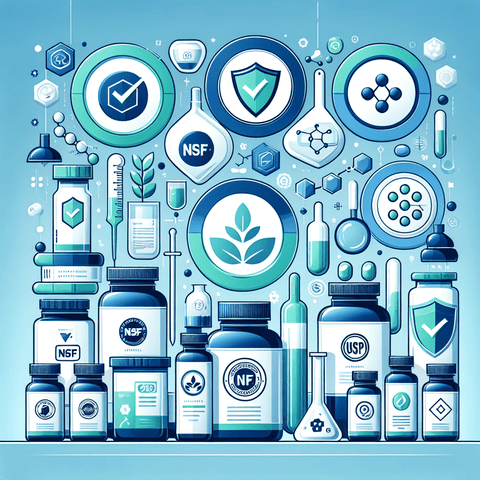Introduction
In 2024, the landscape of health and wellness continues to evolve rapidly, driven by an increasing awareness of personal health management, advances in scientific research, and the proliferation of dietary supplements. From fitness enthusiasts to aging populations, more individuals are turning to nutritional supplements as a means to fill nutritional gaps, support specific health goals, or simply enhance overall wellness. Today, the global dietary supplement market is projected to reach new heights, fueled by a desire for proactive health strategies and a growing trust in science-backed products.
However, with the expanding array of options comes a critical need for consumers to develop the skills to make informed choices. Not all supplements are created equal, and unregulated or poorly manufactured products can pose safety risks or deliver subpar efficacy. Ensuring that your supplementation routine is both safe and effective requires understanding key factors such as ingredient quality, scientific validation, and reputable sourcing.
This comprehensive guide aims to help you navigate the complex world of dietary supplements in 2024. By understanding what to look for, how to verify quality, and how to tailor your nutrition to your individual needs, you can make smarter, safer choices that genuinely support your health goals. Whether you’re new to supplements or looking to refine your current regimen, this guide will equip you with the tools and knowledge necessary to prioritize your well-being today and into the future.
Understanding Dietary Supplements in Nutrition: What Are They and Why Do They Matter?
Dietary supplements encompass a broad category of products intended to complement the diet and provide nutrients that may be lacking or insufficient. They come in various forms—capsules, tablets, powders, liquids—and include a wide range of ingredients such as vitamins, minerals, herbs, amino acids, enzymes, and other specialty compounds. Their primary role is to bridge nutritional gaps, support bodily functions, and promote optimal health.
For example, vitamins and minerals like [Vitamin D](https://www.topvitamine.com/collections/vitamin-d-benefits-sources-safety), [Magnesium](https://www.topvitamine.com/collections/magnesium-benefits-energy-muscle-bone-support), and [Vitamin K](https://www.topvitamine.com/collections/vitamin-k-benefits-bone-blood-health) are essential nutrients that support bone health, immunity, and cardiovascular functions. Herbal extracts like echinacea or ginseng may boost immune response or energy levels, while amino acids are fundamental building blocks of proteins facilitating muscle repair and growth.
The importance of supplements is especially evident in populations where dietary intake may be insufficient—such as vegans, vegetarians, or individuals with certain health conditions. For example, those with limited sun exposure might require Vitamin D supplementation to maintain optimal serum levels. Similarly, aging individuals often need targeted nutrients to support bone density or cognitive health.
Despite their benefits, there are common misconceptions. Some perceive supplements as 'quick fixes' or substitute for a healthy diet, which is misleading. The scientific consensus emphasizes that supplements are intended to support, not replace, balanced nutrition and lifestyle choices. Moreover, evidence for the efficacy of many supplements hinges on rigorous research; thus, understanding the science behind claims is paramount before incorporation into your routine.
Supplement Safety Tips: Ensuring Consumer Well-Being Before You Buy
Safety is the foremost concern when selecting dietary supplements. While many products are safe when used correctly, potential risks include adverse effects, drug interactions, or contamination with toxic substances such as heavy metals or undeclared pharmaceuticals. Recognizing and mitigating these risks begins with education and vigilance.
First, consult with healthcare professionals—like your primary care physician or a registered dietitian—especially if you are pregnant, nursing, taking medications, or managing chronic health conditions. Certain supplements can interact adversely with drugs, such as blood thinners or antihypertensives, leading to complications. For example, high doses of Vitamin K can interfere with blood clotting medications, while excess magnesium may affect cardiovascular medications.
Next, read labels carefully. Ingredients should be clearly listed, and dosage instructions followed precisely. Pay attention to warnings about potential interactions or contraindications, which are often included by reputable manufacturers. Additionally, keep a record of all supplements you take to aid health professionals in managing potential interactions.
Safety Alerts and recall information are vital components of informed purchasing. Regularly check for recalls or safety notices issued by independent agencies or regulatory bodies. While regulations for dietary supplements differ from pharmaceuticals and can sometimes lack stringency, reputable brands proactively seek third-party testing and certification to ensure safety and quality.
Staying informed is critical. Subscribing to newsletters from trusted sources or monitoring updates from consumer watchdog sites ensures you remain aware of emerging safety concerns. The best approach is an informed, cautious mindset—prioritizing safety alongside efficacy for your overall health.
Dietary Supplement Quality Assurance: How to Verify Product Purity and Potency
The supplement industry faces ongoing challenges with product consistency, contamination, and false claims. Quality assurance (QA) is essential for ensuring that what’s on the label matches what's in the bottle, both in terms of purity and potency.
One of the most trustworthy indicators of quality is third-party testing and certification. Organizations like the United States Pharmacopeia (USP), NSF International, and ConsumerLab conduct rigorous testing to verify active ingredient content, contaminants, and manufacturing practices. Look for their logos on supplement labels to identify products that meet these stringent standards.
Manufacturing standards such as Good Manufacturing Practices (GMP) mandated by the FDA set the baseline for quality but are not always sufficient. Third-party testing adds an independent layer of verification to ensure supplement safety and potency. Companies that are transparent about sourcing and manufacturing processes—such as those publishing Certificates of Analysis (COA)—are generally more trustworthy.
Ingredient integrity is another critical factor. Supplements should contain only what’s listed on the label—no unlisted fillers, contaminants, or adulterants. Avoid products with vague ingredient labels or proprietary blends that obscure the active ingredients’ quantities. When possible, opt for brands that disclose sourcing information and employ transparent manufacturing practices.
Contamination issues, such as heavy metals, pesticides, or microbial contamination, can compromise health. Purchasing from reputable, transparent sources reduces these risks significantly. Additionally, online platforms that host verified reviews or connect consumers with lab-tested products can help ensure product quality. Remember, quality comes at a price—cheaper products might cut corners, compromising safety and efficacy.
Reputable Supplement Brands: Choosing Trusted Names in Nutrition
The trustworthiness of a supplement brand can significantly influence the safety and efficacy of the products they offer. Established brands with transparent practices often set industry standards for quality and consumer safety. Such brands invest heavily in quality control, scientific research, and consumer education, making them reliable choices for health-conscious consumers.
When assessing brands, look for those with a clear history of compliance with regulatory standards, positive consumer feedback, and third-party certifications. Brands with a long-standing reputation typically conduct rigorous testing, source high-quality ingredients, and avoid misleading claims. For instance, brands like Topvitamine, which curate a wide selection of verified and certified products, have earned consumer trust through transparency and quality assurance.
Customer reviews and endorsements from health professionals also serve as valuable guidance. They provide insights into product effectiveness, tolerability, and customer service experience. Avoid brands with histories of regulatory violations, false advertising, or reports of contaminated products. Conduct an online search for consumer experiences and industry reviews to further inform your choices.
In the realm of dietary supplements, trust is built over time through consistent quality. Choosing reputable brands ensures that your health investments are less likely to be compromised by adulterated or ineffective products.
Supplement Efficacy Testing: How to Ensure Your Nutritional Support Works as Promised
Efficacy refers to a supplement’s ability to produce the health benefits claimed by the manufacturer. Scientific validation is fundamental to establishing efficacy, preventing consumers from wasting money on ineffective products or risking health with unsubstantiated claims.
Look for supplements supported by clinical trials published in peer-reviewed journals. Such evidence demonstrates that the product or its key ingredients have been tested under controlled conditions and shown to provide specific benefits. For example, clinical data on omega-3 fatty acids (found in DHA/EPA/Omega-3 supplements) support their role in supporting cardiovascular and cognitive health.
Understanding ingredient dosages is also critical. Many supplements contain active ingredients at levels too low to be effective, while others might exceed recommended daily intakes, posing safety concerns. Verify that doses align with scientific research showing efficacy without exceeding safety thresholds.
Bioavailability—how well your body absorbs and uses a supplement—affects efficacy. Formulations designed for enhanced absorption (e.g., liposomal vitamin C) often deliver better results. Reputable scientific sources and government health sites provide guidance on what constitutes effective dosing and formulations.
Use trusted outlets such as scientific journals, governmental health agencies, or reputable review platforms to verify claims. Remember, supplements with robust scientific backing are more likely to deliver real health benefits, making them a worthwhile investment in your wellness routine.
Choosing the Right Supplement: Tailoring Your Nutrition Strategy for 2024
One size does not fit all when it comes to dietary supplements. Personalization is key to optimizing health and safety. Assessing your individual needs involves understanding your age, gender, lifestyle, and physiological status.
For instance, women under 50 may focus on folate and iron, while postmenopausal women might prioritize calcium and Vitamin D ([see Vitamin D benefits](https://www.topvitamine.com/collections/vitamin-d-benefits-sources-safety)). Older adults may need supplements targeting bone health, cognitive support, or immune function. Athletes or highly active adults could benefit from amino acids or electrolytes like magnesium ([see Magnesium benefits](https://www.topvitamine.com/collections/magnesium-benefits-energy-muscle-bone-support)).
Understanding your nutritional gaps—perhaps identified through blood tests or diet analysis—enables targeted supplementation. Remember to choose the appropriate dosage and form—capsule, powder, liquid—that suits your preferences and lifestyle. For example, liquids may be easier for some to swallow, while capsules offer convenience and better stability.
Safety remains paramount—combine supplements thoughtfully with a balanced diet and exercise routine. Consulting healthcare providers for personalized guidance ensures your supplement strategy aligns with your health goals without unintended interactions or overdoses.
Track your response to new supplements, noting any improvements or adverse effects. Regular monitoring and adjustments help you optimize your regimen for sustainable health benefits in 2024 and beyond.
Conclusion
Choosing safe and effective dietary supplements in 2024 involves a combination of informed research, critical evaluation, and personal tailoring. Prioritizing quality assurance, verifying scientific backing, and selecting reputable brands help mitigate risks and maximize benefits. Remember, supplements are tools to support a healthy lifestyle—not replacements for balanced nutrition or medical treatment.
Stay vigilant about safety, educate yourself about ingredients, and consult professionals when needed. Incorporate supplements thoughtfully into your routine, aligning them with your individual needs and health goals. With these principles, you can confidently build a sustainable, health-focused supplement regimen that enhances your wellness journey this year and in the future.
Q&A Section
Q: How can I tell if a supplement is safe to take?
A: Look for products with third-party certification labels such as USP, NSF, or ConsumerLab, which verify purity and potency. Always read labels thoroughly, follow recommended dosages, and consult with a healthcare professional—especially if you have underlying health conditions or are on medication.
Q: Are all supplements effective just because they contain certain ingredients?
A: Not necessarily. Efficacy depends on the ingredient's dose, bioavailability, and scientific backing. Check for clinical research supporting the specific formulation and dosage to ensure the supplement can deliver the claimed benefits.
Q: Can I replace my medication with supplements?
A: No. Supplements are meant to support health and fill nutritional gaps, not replace prescribed medications. Always consult your healthcare provider before making changes to your medical treatment plan.
Q: How do I know if a supplement is from a reputable brand?
A: Reputable brands typically have transparent sourcing, third-party testing, positive customer reviews, and a history of compliance with regulations. Research the brand’s reputation and look for certifications before purchasing.
Q: How do I personalize my supplement routine?
A: Assess your diet, health goals, age, and lifestyle. Consider consulting with a healthcare professional or dietitian to identify nutritional gaps and determine appropriate supplements and dosages. Regular monitoring allows you to make adjustments as your needs evolve.
Important Keywords
- Dietary Supplements
- Supplement Safety
- Supplement Quality Assurance
- Reputable Supplement Brands
- Supplement Efficacy
- Personalized Nutrition
- Third-Party Testing
- Health and Wellness
- Vitamin D, Magnesium, Vitamin K
- Omega-3 Supplements
- Informed Supplement Choices



